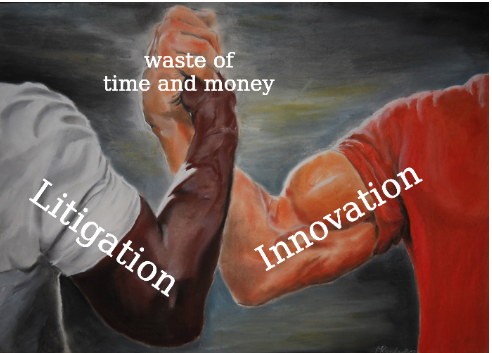

THE European Patent Office (EPO) is led not by a scientist; several consecutive presidents, including António Campinos, had no background in science, so it's hardly surprising they deem lawyers -- not scientists -- as those to be served. And they even use terms such as "Clients" or "Customers" (as if the EPO is a private, for-profit corporation whose sole goal is maximising revenue).
"How about databases on the network? Oh, blockchains? Yes, let's just overcomplicate things."This very simple (albeit not shallow) observation could not be avoided or overlooked by EPO staff, notably examiners. Who are they even led or managed by? A nonscientific, law-breaking cabal often younger than the examiners themselves? People who choose buzzwords over substance? Mere marketing lingo which they can't even explain, let alone understand? Earlier this week we saw the EPO promoting software patents in Europe again -- patents that are illegal and can only be excused using hype waves few people can grasp. How about databases on the network? Oh, blockchains? Yes, let's just overcomplicate things.
"A year ago," the EPO tweeted, "experts in #blockchain discussed its possible impact on the #patent system."
The EPO has since then distorted its guidelines to permit if not encourage patents on "hey hi" (AI) and stuff like "blockchain" (most algorithms that depend on some database can be spun or twisted that way). Got some data? Got some logic (loops and conditional statements)? Give it to some attorney who can spin that as some "hey hi on the blockchain..."
"X on a car"
"Y on a mobile"
"Z over the Internet"
Remember all those "on a computer" patents?
That fashion is back in Europe, having been borrowed from the US.
"The EPO has since then distorted its guidelines to permit if not encourage patents on "hey hi" (AI) and stuff like "blockchain" (most algorithms that depend on some database can be spun or twisted that way)."Hey, it's not like examiners can refuse, right? With new guidelines in effect and with growing risk of dismissal, it's a lot safer for them to swiftly grant these bogus patents. "Patentees Need to Act Fast as the EPO Opposition Timeline Tightens" is the title of what Watchtroll posted yesterday. Watchtroll is a close ally of the EPO and it shares its attacks on judges with EPO management. They're fantastical patent zealots and this article was of course composed by litigation people, Katherine Green & Emily Hayes (first article in Watchtroll). Taking EPO advice from Watchtroll would seem suitable to EPO management, but not anybody else. Watchtroll is a radical site, which says (this week) that "Now is the Time to Put the PTAB [the court itself] on Trial" (article by Gene Quinn, the founder). Maybe they'll also call for assassination of patent judges one day (revenge for 'killing' patents).
What's it all about? It's about PTAB applying the law, 35 U.S.C. ۤ 101, to invalidate patents wrongly granted by the USPTO. So Watchtroll wants the judges themselves to be put on trial! Perfectly normal, right?
In EPOnia the attack on judges has been normalised, as was the attack on the media. The EPO sent threats to journalists and bribed a lot of them as well. So now we're left with no objective coverage (if any) about EPO scandals. Even past EPO critics (publications) seem to have sacked good writers, replacing them with 'docile' corporate writers. Check out this new EPO puff piece from World Intellectual Property Review (WIPR), composed by Rory O'Neill who ended up copy-pasting quotes from the EPO's press release while offering nothing new, no insights. Is this what qualifies as "journalism" nowadays? Maybe they should also frame every Donald Trump "tweet" as fact and present that as "journalism".
"In EPOnia the attack on judges has been normalised, as was the attack on the media."The EPO has meanwhile published this latest nonsense (warning: epo.org link) about a "Working Party"; it used to present "Working Party" for patent quality (obviously a publicity stunt), but this one is for "Guidelines" because the latest EPO guidelines likely violate the EPC in a lot of ways. To quote the press release:
Members of the SACEPO Working Party on Guidelines and the EPO met on 27 November to discuss the annual revision of the Guidelines for Examination in the EPO and the Guidelines for Search and Examination at the EPO as PCT Authority.
[...]
The meeting formed a part of the EPO’s efforts to involve users in the revision of the Guidelines, a goal expressed in the Strategic Plan 2023 that was adopted by the EPO’s Administrative Council in June. During the meeting a move to broaden the spectrum of external involvement through a public online consultation on the Guidelines was unanimously embraced by the participants. The meeting was also used by the Working Party members and the EPO to discuss the details of the planned consultation which should start in March next year.